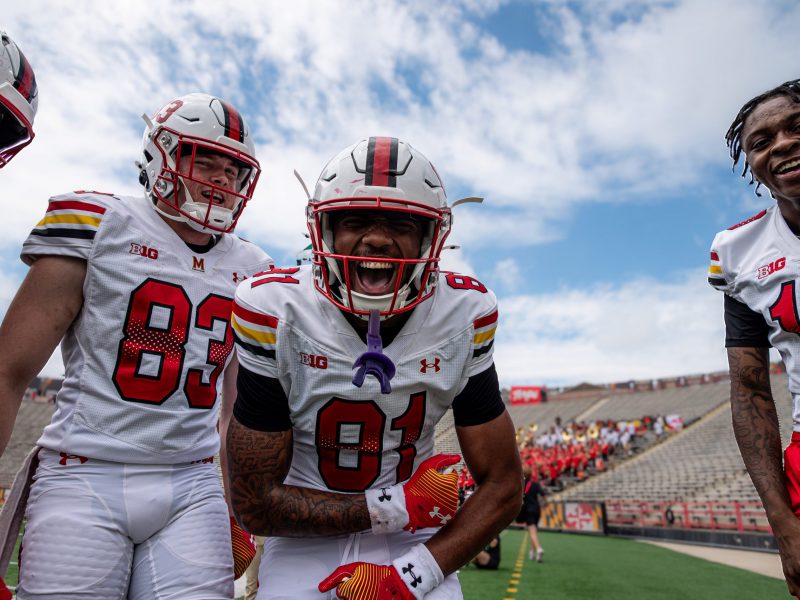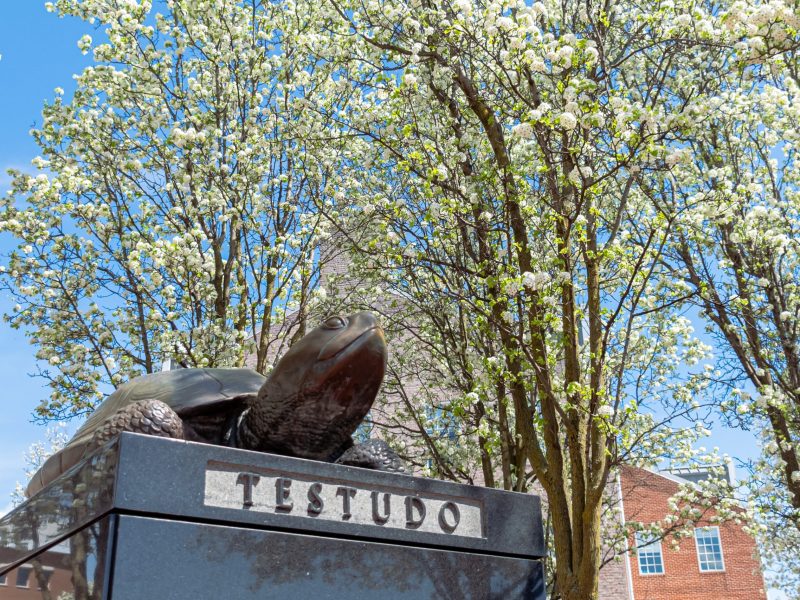Click here for video coverage of Palestinian Solidarity Week.
Gisica Abdallah’s mother still has the key to their West Bank home.
The senior dietetics major’s parents were forced to escape to Jordan in 1976 due to a lack of jobs and mounting pressure from Israel. Abdallah then grew up in Jordan, but a child at the time, she had little clue as to the dangers developing in her homeland.
“They didn’t have a future, and they didn’t want [my sister and I] to grow up without one,” she said. “They didn’t have anything.”
To many students, the Israeli-Palestinian conflict is often talked about on the nightly news, but carries little personal impact. Last week’s Palestinian Solidarity Week on the campus, which was organized by several student groups, including the Muslim Students’ Association, brought the controversial topic to the forefront of the university’s attention through various programs and events.
But while organizers hoped Palestinian Solidarity Week would give students a glimpse of the Palestinian side of the struggle, they were met with resistance, both in the form of torn-down fliers before the week started and offensive posters characterizing Palestinians as violent that were anonymously hung after an event last Tuesday.
Palestinian students and their supporters point to the posters, which had been investigated as a hate crime, as an example of the one-sided dialogue the Israeli-Palestinian issue receives on this campus. Because of the university’s large Jewish population and the United States’ political sympathies toward Israel, it is a challenge for Palestinian students to have a presence, let alone a voice, on the campus, they said.
“It’s so easy to walk up to a person on campus and ask, ‘What do you know about Israel?’ or ‘What do you know about the Israeli conflict?’ and they automatically assume that Israel is right all the time,” Abdallah said. “It’s such a great number of people that it’s so hard to be on the other end and say, ‘Look, we have a story.'”
Yet some Jewish leaders on the campus said that while they understood the goal of Palestinian Solidarity Week, the events did little to promote a two-sided dialogue between students about the issue. For Aimee Mayer, president of the university chapter of the Union for Progressive Zionists – an organization that is “the voice of the Zionist Left,” according to their website – open communication about the Israeli-Palestinian conflict on campus is still sorely lacking.
“This is a campus that doesn’t have a lot of dialogue on it,” Mayer said. “In this way, I thought Palestinian Solidarity Week was great. But that said, I don’t think a lot of their events were open for dialogue. Some students felt that the events themselves ended dialogue from the beginning. But it’s a starting point.”
During the week, audiences were given statistics about the number of Palestinian deaths against those of Israelis, with the number of the former skyrocketing over the latter. As of a 2007 report by the United Nations’ Office for the Coordination of Humanitarian Affairs, there have been more than 4,000 Palestinian deaths and more than 1,000 Israeli deaths as a result of the conflict since September 2000. Those numbers, however, do not include the bout of violence which killed more than 1,300 Palestinians and 13 Israeli soldiers between December and mid-January, according to a field report by OCHA.
However, these numbers are often overlooked by a pro-Israel media, said Alison Weir, the speaker for last Thursday’s event, “The Palestinian Massacre Will Not Be Televised.” She is the founder of If Americans Knew, an institute that raises awareness about the Israeli-Palestinian conflict.
“The U.S. connection is the omission that is probably significant,” she said. “Checkpoints are not tollbooths or something. They’re soldiers with machine guns … this is routine. The information is there, we’re just not getting it.”
Sami Elzaharna, a senior computer science major, remembers the Israeli enforced curfews. While his parents are from Gaza, he was born in Annapolis and moved to the Middle East with his family at the age of 5. He returned to the United States to attend this university. Since then, he has made repeated trips to Gaza to visit aunts, uncles and hundreds of cousins. As a child on those visits, Elzaharna’s nights outside ended at 8:30 p.m. – after that, the curfew was in effect.
“I remember during the 1994 World Cup,” Elzaharna said. “We’re watching [it] over there and it started a little late, because it was in the U.S. at the time. So we wanted to go get food or something, but it was after the curfew. So I remember, my cousin and I, we would go sneaking behind walls just to go to a shop to get food. These things clearly stick out in my mind.”
While the conflict is often characterized as simply religious, there are other layers of complexity regarding territorial and boundary disputes and who has rightful claim to the land. As a result, the conflict affects not only all who live in the region, but also impacts the opinions of people who live in the United States and other countries with an interest in the issue, said Melissa Waksman, president of the Jewish Student Union, in an e-mail.
“I think one must keep in mind that this issue of Palestinian Solidarity Week is not about Muslims and Jews, but Israelis and Palestinians,” Waksman wrote. “It is important to know that there are members of both religions who are on both sides of the playing field and not the sides one would expect. I believe the religion of the person is independent of the political views of the person, and a person’s religion does not necessarily dictate who they are politically.”
Abdallah, a Christian, remembers her mother’s stories of how the West Bank used to be a place where neighbors lived in peace – Christians, Jews and Muslims lived side-by-side in one community, she said. But Abdallah’s family was forced out of their home, moving from place to place before finally settling in Jordan as refugees. After living in Jordan for 10 years, a relative living in the United States called with an opportunity for the family to live in the country. They had 20 days to pack their things and leave.
The definition of occupation is a question not easily answered by either Palestinians or Israelis, but for Palestinian students on the campus, the meaning of the word is clear: Occupation is an unexposed persecution.
Abdallah and Elzaharna recounted story after story where domination and cruelty – and poor sanitation and poverty because of an Israeli chokehold – were common themes. Ten years after coming to the U.S., Abdallah returned to Palestine to visit family. She was shocked to find her aunts, uncles, cousins and grandparents living without clean water or electricity and with nowhere to go.
“[My cousin] pointed at these streets that they’re not allowed to look at, because if a soldier saw you peek at that street or glance at that street, you were automatically dead,” she said. “This is occupation. That even though it’s ‘peaceful’ on the West Bank, you still have streets that are blocked off, you still have a prison where people aren’t allowed to leave their homes at times. You can’t go beyond your limits.”
Elzaharna told a similar story of brutality.
“I remember once when my aunt … was on the street a few minutes after curfew and she was whipped,” he said. “So she came home at the time and she had to lay down on her stomach for the next couple of days because her whole back was whipped and lashed.”
It was those kinds of experiences that Abdallah, Elzaharna and other students wanted to share during the week – and now, after the events are over, efforts are still being made by the MSA and the Organization of Arab Students to work with Jewish student organizations to create an open dialogue.
“I hope there is an opportunity for us to move forward and cooperate,” Mayer said. “We’re not really looking for two different things. Everyone is looking for peace, safety and justice.”
Communication and education are key components in voicing clashing opinions, Elzaharna said. Without solid understanding and willingness to see differing perspectives, there is no opportunity to make change.
“I think that most people don’t know any better,” he said. “I don’t blame people for that. When I speak to people, I just tell them our side of the story and then let them make a decision on their own, but I find that the majority of the time, people tend to see the other side. But it can get frustrating sometimes, when you’re talking to people and you just hear the same thing over and over again. It needs patience on our side.”
hamptondbk@gmail.com


